2022年中考英语(人教版)一轮复习九年级全册Units 11—12课件(53张PPT)
文档属性
| 名称 | 2022年中考英语(人教版)一轮复习九年级全册Units 11—12课件(53张PPT) | 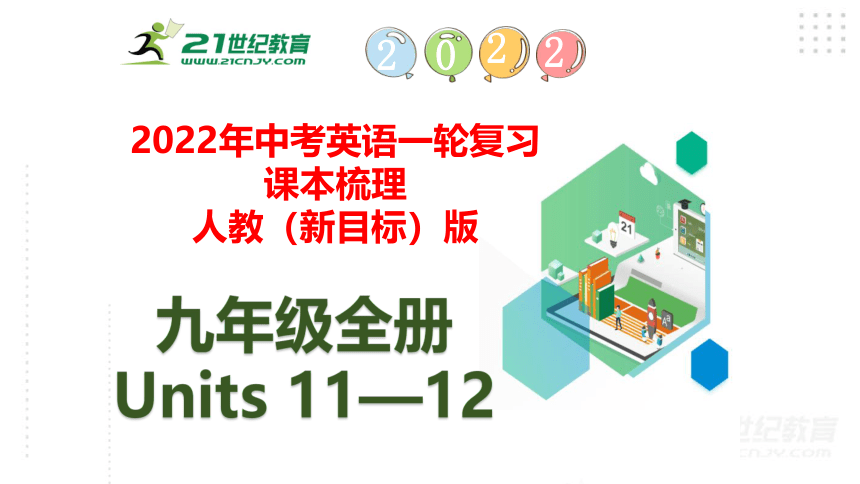 | |
| 格式 | pptx | ||
| 文件大小 | 861.6KB | ||
| 资源类型 | 试卷 | ||
| 版本资源 | 人教新目标(Go for it)版 | ||
| 科目 | 英语 | ||
| 更新时间 | 2022-01-16 16:49:18 | ||
图片预览

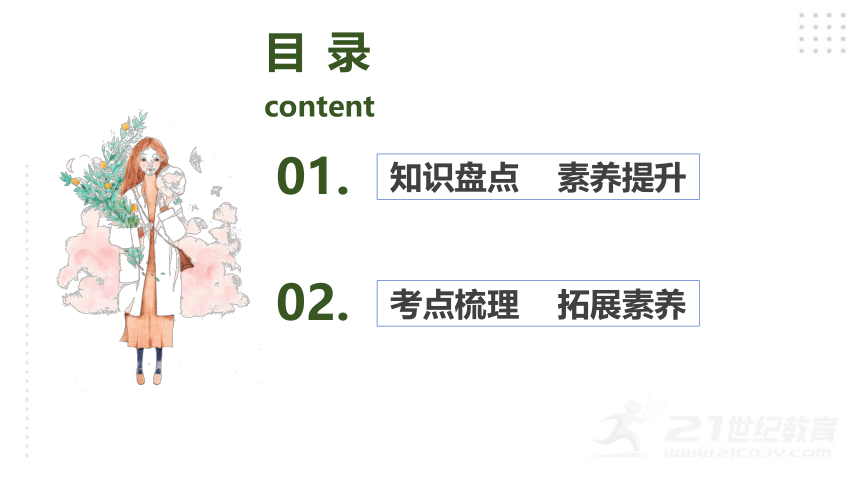
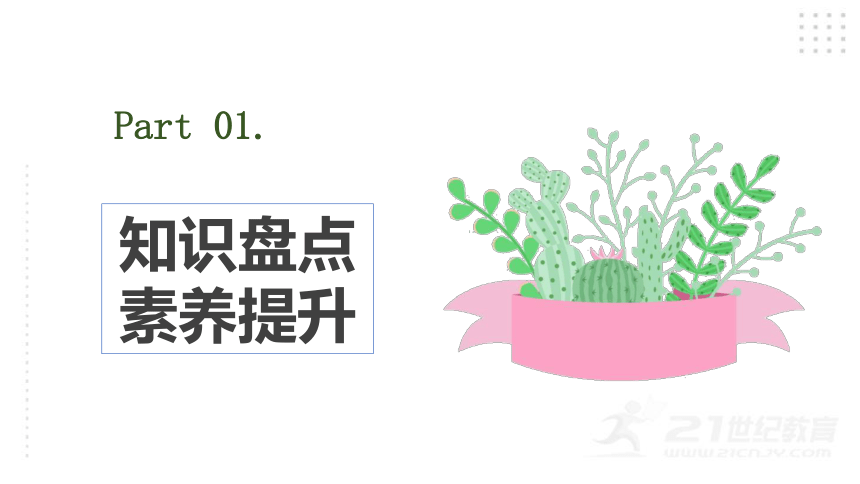
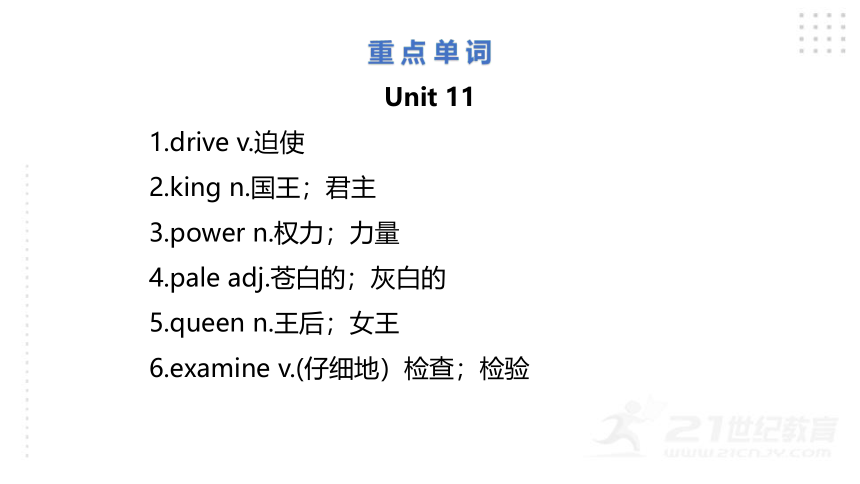

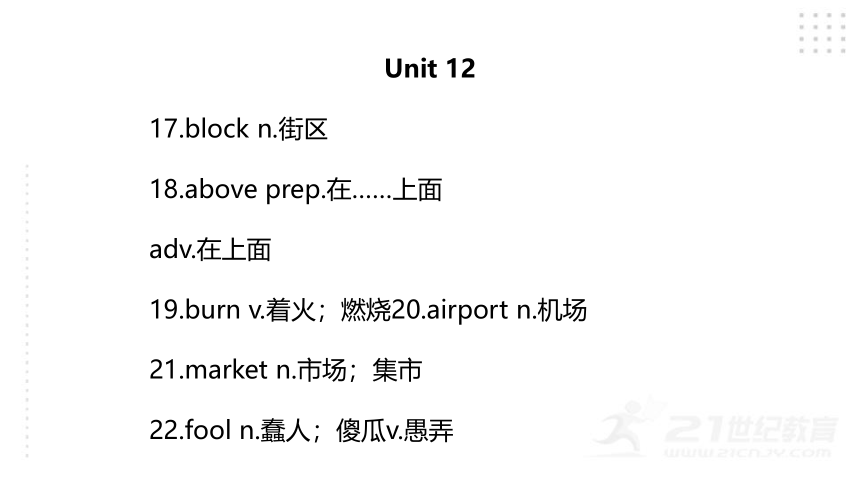
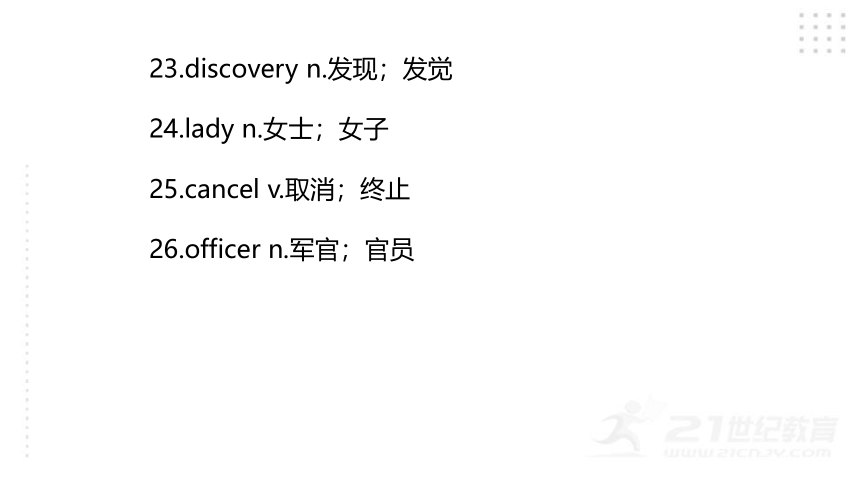
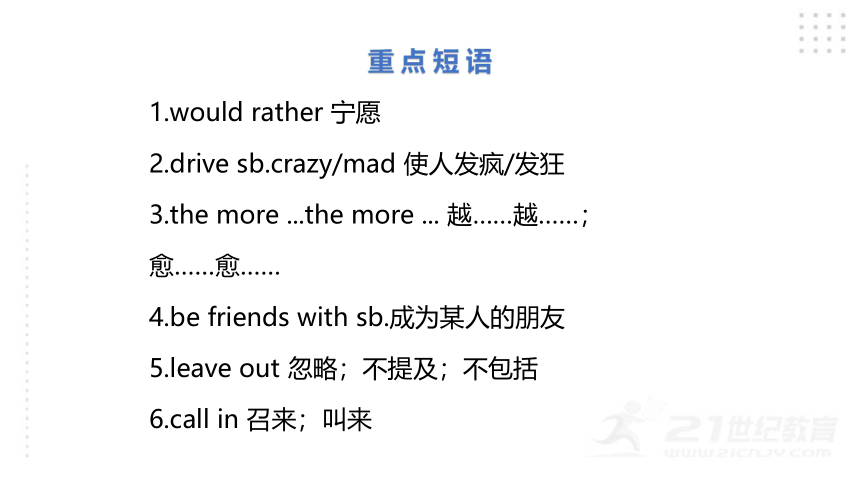
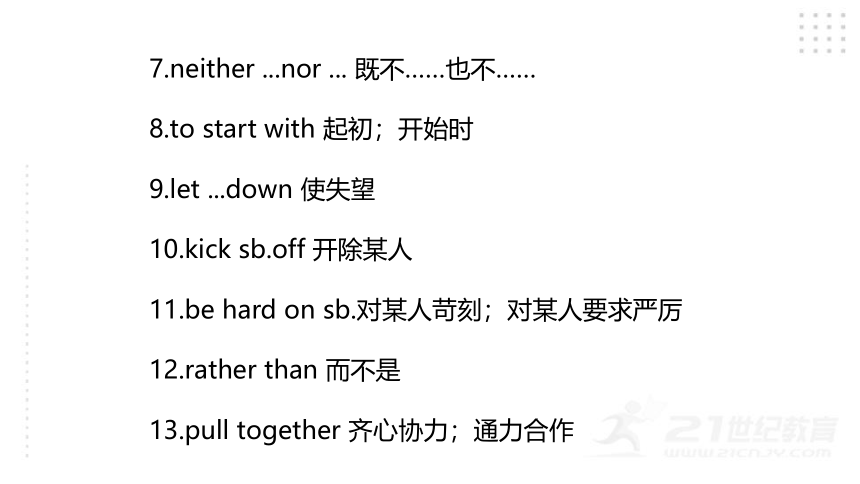
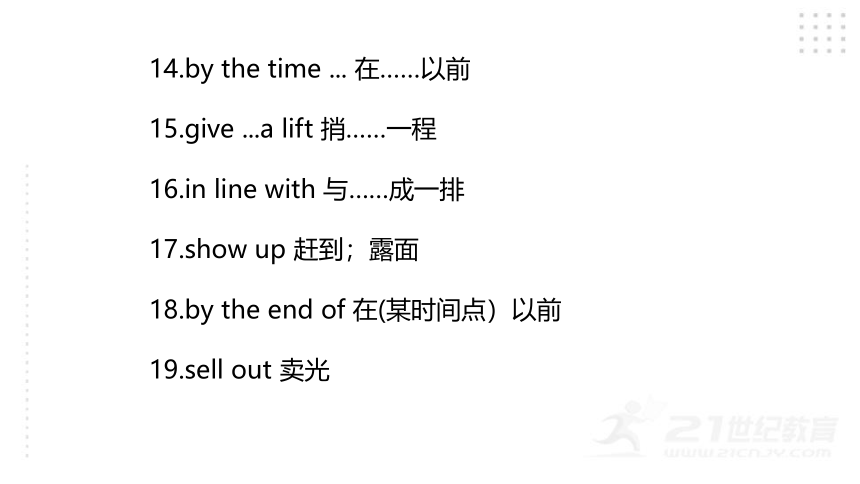

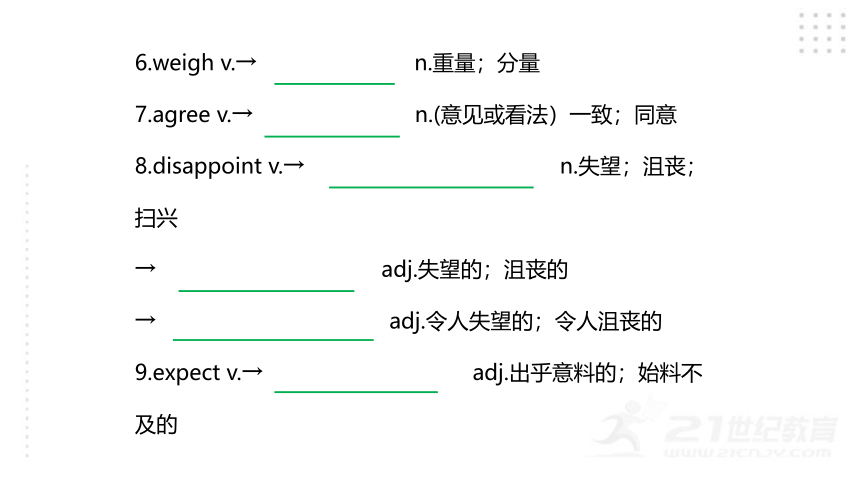
文档简介
(共53张PPT)
2
0
2
2
2022年中考英语一轮复习
课本梳理
人教(新目标)版
九年级全册
Units 11—12
知识盘点 素养提升
考点梳理 拓展素养
目录
content
01.
02.
Part 01.
知识盘点 素养提升
重 点 单 词
Unit 11
1.drive v.迫使
2.king n.国王;君主
3.power n.权力;力量
4.pale adj.苍白的;灰白的
5.queen n.王后;女王
6.examine v.(仔细地)检查;检验
7.palace n.王宫;宫殿 8.wealth n.财富
9.grey adj.(天空)阴沉的;昏暗的;灰色的
10.shoulder n.肩;肩膀
11.goal n.球门;射门;目标
12.coach n.教练;私人教师
13.kick v.踢;踹 14.courage n.勇敢;勇气
15.pull v.拉;拖 16.nod v.点头
Unit 12
17.block n.街区
18.above prep.在……上面
adv.在上面
19.burn v.着火;燃烧20.airport n.机场
21.market n.市场;集市
22.fool n.蠢人;傻瓜v.愚弄
23.discovery n.发现;发觉
24.lady n.女士;女子
25.cancel v.取消;终止
26.officer n.军官;官员
重 点 短 语
1.would rather 宁愿
2.drive sb.crazy/mad 使人发疯/发狂
3.the more ...the more ... 越……越……;
愈……愈……
4.be friends with sb.成为某人的朋友
5.leave out 忽略;不提及;不包括
6.call in 召来;叫来
7.neither ...nor ... 既不……也不……
8.to start with 起初;开始时
9.let ...down 使失望
10.kick sb.off 开除某人
11.be hard on sb.对某人苛刻;对某人要求严厉
12.rather than 而不是
13.pull together 齐心协力;通力合作
14.by the time ... 在……以前
15.give ...a lift 捎……一程
16.in line with 与……成一排
17.show up 赶到;露面
18.by the end of 在(某时间点)以前
19.sell out 卖光
词 汇 拓 展
1.friend n.→ friendship n.友谊;友情
2.power n.→ powerful adj.强有力的;有影响力的
3.bank n.→ banker n.银行家
4.wealth n.→ wealthy adj.富有的
5.comfortable adj.→ uncomfortable (反义词)使人不舒服的;令人不舒适的
6.weigh v.→ weight n.重量;分量
7.agree v.→ agreement n.(意见或看法)一致;同意
8.disappoint v.→ disappointment n.失望;沮丧;扫兴
→ disappointed adj.失望的;沮丧的
→ disappointing adj.令人失望的;令人沮丧的
9.expect v.→ unexpected adj.出乎意料的;始料不及的
10.oversleep v.→ overslept (过去式/过去分词)睡过头;睡得太久
11.work v.→ worker n.工作者;工人
12.believe v.→ believable adj.可相信的;可信任的
→ unbelievable (反义词)难以置信的;不真实的
→ belief n.相信;信仰
→ disbelief (反义词)不信;怀疑
13.burn v.→ burnt/burned (过去式/过去分词)着火;燃烧
→ burning adj.着火的;燃烧的
14.live v.→ alive adj.活着;有生气的
→ lively adj.生气勃勃的;(色彩)鲜艳的
→ living adj.活的
15.fool n.& v.→ foolish adj.愚蠢的;傻的
16.discovery n.→ discover v.发现;发觉
17.appear v.→ disappear (反义词)消失;不见
重 点 句 型
1.Sad movies make me cry .悲伤的电影让我哭泣。
2.I'd rather go to Blue Ocean because I like to listen to quiet music while I'm eating.我宁愿去蓝色海洋(饭店),因为我吃饭时喜欢听安静的音乐。
3.Well, the more I get to know Julie, the more I realize that we have a lot in common .噢,我越了解朱莉,就越认识到我们有很多共同点。
4. Neither medicine nor rest can help him.无论是药物还是休息都不能帮助他。
5.When I got to school,I realized that I had left my backpack at home.当我到达学校时,我意识到我把书包落在家里了。
6. By the time I got back to school,the bell had rung .到我回到学校时,铃声已经响了。
7.I was about to go up when I decided to get a coffee first.我正要上楼,这时我决定先去买杯咖啡。
8.As I was waiting in line with other office workers,I heard a loud sound.正当我和其他办公室职员在排队等候时,我听到一声巨响。
情 景 交 际
谈论事情如何影响你
—What makes you angry 什么使你生气?
—When people throw rubbish on the streets,it makes me angry.当人们在街上扔垃圾时,那令我生气。
Part 02.
考点梳理
素养提升
Sad movies make me cry.悲伤的电影让我哭泣。(Unit 11 P81)
【点拨】make意为“使得;使变得;使成为”时,常见用法如下:
考点1
用法 含义 例句
make sb./ sth.+形容词 使某人或某物…… The news made him happy.这个消息使他很高兴。
make sb./ sth.+名词 使某人/某物成为…… Do you think we can make our school a green school 你认为我们能使学校成为绿色学校吗?
用法 含义 例句
make sb. do sth. 使某人做某事 Nothing will make me change my mind.什么也改变不了我的主意。
make+ 反身代词+ 过去分词 使……被…… She couldn't make herself heard above the noise of the traffic.车辆噪音很大,她无法让人听到她的声音。
用法 含义 例句
make it +时间 把时间约定在…… Let's make it 9:00 am.让我们把时间约定在上午九点吧。
注:(1)make sb.do sth.变为被动语态时要加不定式符号to,即sb.be made to do sth.。 (2)“make it+形容词/名词+不定式/从句”结构中,it作形式宾语,不定式/从句是真正的宾语。 [其他使役动词和感官动词等用法相同]
( B )1.(2021·岳阳改编)The socialist new countryside(社会主义新农村) makes farmers their living conditions.
A.to improve B.improve
C.improving D.improves
学以致用
( B )2. —Clara,you have _______ Journey to the West for two weeks.
—Sorry,I wanted to give it back but was made _______Dazhou on business last week.
A.borrowed;to leave B.kept;to leave
C.kept;leave D.borrowed;leave
3.(2021·大庆)He spoke louder to make himself heard (hear).
4.格林先生使我们很容易地学习英语。
Mr.Green made it easy for us to learn English.
I'd rather go to Blue Ocean because I like to listen to quiet music while I'm eating.我宁愿去蓝色海洋(饭店),因为我吃饭时喜欢听安静的音乐。(Unit 11 P81)
考点2
【点拨】'd rather是would rather的缩写形式,意为“宁愿”,没有人称、数和时态的变化。常用结构为:would rather do sth.,否定形式为would rather not do sth.,此结构常用来表示主观上的愿望、偏爱或选择。如:
I'd rather stay at home and watch TV.我宁愿待在家看电视。
I would rather not go to the zoo.我宁愿不去动物园。
【拓展】would rather do sth.than do sth.意为“宁愿……而不愿……”(此结构中如果前后动词相同,则than后面的动词可以省略),相当于prefer to do sth. rather than do sth.,也可以改写成would do sth.rather than do sth.。如:
I would rather watch TV at home than go to the movies.
=I would watch TV at home rather than go to the movies.我宁愿在家看电视也不愿去看电影。
( C )1.(2021·甘肃)—Would you like to go out for dinner tonight
—No,I'd rather at home.
A.to eat B.eating
C.eat D.ate
学以致用
( C )2.—My uncle is against wasting anything.
—No wonder he would rather the old bike than a new one.
A.repair;to buyB.to repair;buy
C.repair;buyD.to repair;to buy
学以致用
Well,the more I get to know Julie,the more I realize that we have a lot in common.噢,我越了解朱莉,就越认识到我们有很多共同点。(Unit 11 P82)
考点3
【点拨】“the+比较级,the+比较级”意为“越……就越……”,表示两个方面同样程度的增长或减少,或一方增长的程度相当于另一方减少的程度。此句相当于一个主从复合句,其中前面的句子看作状语从句,后面的句子看作主句。主从句的时态常用一般现在时或一般过去时;若主句的谓语动词用一般将来时,从句的谓语动词要用一般现在时表示将来。
如:The more she learns,the more she wants to learn.她越学越想学。The harder he worked,the more he got.他工作越努力,得到的就越多。
The harder you work,the greater progress you will make.
(=If you work harder,you'll make greater progress.)你越用功,进步就越大。
【拓展】此句型的特点是前后都可以有所省略,特别是谚语、俗语,只要意义明确,越简单越好。如:The more,the better.多多益善。
The sooner (it is),the better (it will be).越早越好。
( B )1.(2021·贺州)During the exam, you are,
mistakes you'll make.
A.the more careful;the less
B.the more careful;the fewer
C.the more careless;the less
D.the more careless;the fewer
学以致用
( C )2. Jenny,it's time to practice the piano. ________you practice, _______you'll play.
A.More;better
B.More;worse
C.The more;the better
D.The less;the better
3.The higher we climbed,the thinner (thin) the air became.
4.(2021·黄石)孩子们越早学会独立,对他们的未来越好。
The earlier kids learn to be independent, the better it is for their future.
5.一个人书读得越多,就会变得越聪明。
The more books a person reads, the wiser/cleverer he will be/become .
The next day,Peter went to soccer practice with courage rather than fear in his heart.第二天,彼得并没有害怕,而是勇敢地去参加足球训练。(Unit 11 P86)
考点4
【点拨】rather than意为“并非;而不是”,常用作连词词组,连接两个并列成分,表示在两者之间进行选择,意为“是A而不是B;要A不要B;宁愿A而不愿B”,后面可以接名词、代词、动词、介词短语等。当rather than连接两个名词或代词作主语时,谓语动词应与rather than前面的名词或代词在人称和数上保持一致。如:
He likes going to the park in the evening rather than in the morning.他喜欢晚上去公园,而不喜欢早上去。
You rather than she are going to clean the classroom.是你而不是她要去打扫教室。
He preferred to drink tea rather than drink water.他宁愿喝茶而不愿喝水。
(更多用法见P148考点1第⑤点及本章考点2【拓展】)
( C ) —Dr. Zhong Nanshan preferred ____________ to Wuhan rather than at home safely.
—What a great doctor!
A.to go;to stay B.go;to stay
C.to go;stay D.go;stay
2.她喜欢唱歌,而不喜欢跳舞。
She enjoys singing rather than dancing.
学以致用
By the time I got up,my brother had already gotten in the shower.到我起床时,我哥哥已经进淋浴间了。(Unit 12 P89)
考点5
【点拨】by the time意为“到……时候为止”,强调的是从过去某一时间点开始到从句所表示的时间为止的这段时间,主句谓语动词的动作发生在从句谓语动词的动作之前,主句只能用过去完成时态。如:By the time I got home,my mother had cooked supper.当我到家时,妈妈已经做好晚饭了。
( C )1. By the time the teacher came,we _________ cleaning the classroom.
A.finished B.have finished
C.had finished D.has finished
2.By the time David called (call),we had already gone out.
学以致用
2
0
2
2
2022年中考英语一轮复习
课本梳理
人教(新目标)版
九年级全册
Units 11—12
知识盘点 素养提升
考点梳理 拓展素养
目录
content
01.
02.
Part 01.
知识盘点 素养提升
重 点 单 词
Unit 11
1.drive v.迫使
2.king n.国王;君主
3.power n.权力;力量
4.pale adj.苍白的;灰白的
5.queen n.王后;女王
6.examine v.(仔细地)检查;检验
7.palace n.王宫;宫殿 8.wealth n.财富
9.grey adj.(天空)阴沉的;昏暗的;灰色的
10.shoulder n.肩;肩膀
11.goal n.球门;射门;目标
12.coach n.教练;私人教师
13.kick v.踢;踹 14.courage n.勇敢;勇气
15.pull v.拉;拖 16.nod v.点头
Unit 12
17.block n.街区
18.above prep.在……上面
adv.在上面
19.burn v.着火;燃烧20.airport n.机场
21.market n.市场;集市
22.fool n.蠢人;傻瓜v.愚弄
23.discovery n.发现;发觉
24.lady n.女士;女子
25.cancel v.取消;终止
26.officer n.军官;官员
重 点 短 语
1.would rather 宁愿
2.drive sb.crazy/mad 使人发疯/发狂
3.the more ...the more ... 越……越……;
愈……愈……
4.be friends with sb.成为某人的朋友
5.leave out 忽略;不提及;不包括
6.call in 召来;叫来
7.neither ...nor ... 既不……也不……
8.to start with 起初;开始时
9.let ...down 使失望
10.kick sb.off 开除某人
11.be hard on sb.对某人苛刻;对某人要求严厉
12.rather than 而不是
13.pull together 齐心协力;通力合作
14.by the time ... 在……以前
15.give ...a lift 捎……一程
16.in line with 与……成一排
17.show up 赶到;露面
18.by the end of 在(某时间点)以前
19.sell out 卖光
词 汇 拓 展
1.friend n.→ friendship n.友谊;友情
2.power n.→ powerful adj.强有力的;有影响力的
3.bank n.→ banker n.银行家
4.wealth n.→ wealthy adj.富有的
5.comfortable adj.→ uncomfortable (反义词)使人不舒服的;令人不舒适的
6.weigh v.→ weight n.重量;分量
7.agree v.→ agreement n.(意见或看法)一致;同意
8.disappoint v.→ disappointment n.失望;沮丧;扫兴
→ disappointed adj.失望的;沮丧的
→ disappointing adj.令人失望的;令人沮丧的
9.expect v.→ unexpected adj.出乎意料的;始料不及的
10.oversleep v.→ overslept (过去式/过去分词)睡过头;睡得太久
11.work v.→ worker n.工作者;工人
12.believe v.→ believable adj.可相信的;可信任的
→ unbelievable (反义词)难以置信的;不真实的
→ belief n.相信;信仰
→ disbelief (反义词)不信;怀疑
13.burn v.→ burnt/burned (过去式/过去分词)着火;燃烧
→ burning adj.着火的;燃烧的
14.live v.→ alive adj.活着;有生气的
→ lively adj.生气勃勃的;(色彩)鲜艳的
→ living adj.活的
15.fool n.& v.→ foolish adj.愚蠢的;傻的
16.discovery n.→ discover v.发现;发觉
17.appear v.→ disappear (反义词)消失;不见
重 点 句 型
1.Sad movies make me cry .悲伤的电影让我哭泣。
2.I'd rather go to Blue Ocean because I like to listen to quiet music while I'm eating.我宁愿去蓝色海洋(饭店),因为我吃饭时喜欢听安静的音乐。
3.Well, the more I get to know Julie, the more I realize that we have a lot in common .噢,我越了解朱莉,就越认识到我们有很多共同点。
4. Neither medicine nor rest can help him.无论是药物还是休息都不能帮助他。
5.When I got to school,I realized that I had left my backpack at home.当我到达学校时,我意识到我把书包落在家里了。
6. By the time I got back to school,the bell had rung .到我回到学校时,铃声已经响了。
7.I was about to go up when I decided to get a coffee first.我正要上楼,这时我决定先去买杯咖啡。
8.As I was waiting in line with other office workers,I heard a loud sound.正当我和其他办公室职员在排队等候时,我听到一声巨响。
情 景 交 际
谈论事情如何影响你
—What makes you angry 什么使你生气?
—When people throw rubbish on the streets,it makes me angry.当人们在街上扔垃圾时,那令我生气。
Part 02.
考点梳理
素养提升
Sad movies make me cry.悲伤的电影让我哭泣。(Unit 11 P81)
【点拨】make意为“使得;使变得;使成为”时,常见用法如下:
考点1
用法 含义 例句
make sb./ sth.+形容词 使某人或某物…… The news made him happy.这个消息使他很高兴。
make sb./ sth.+名词 使某人/某物成为…… Do you think we can make our school a green school 你认为我们能使学校成为绿色学校吗?
用法 含义 例句
make sb. do sth. 使某人做某事 Nothing will make me change my mind.什么也改变不了我的主意。
make+ 反身代词+ 过去分词 使……被…… She couldn't make herself heard above the noise of the traffic.车辆噪音很大,她无法让人听到她的声音。
用法 含义 例句
make it +时间 把时间约定在…… Let's make it 9:00 am.让我们把时间约定在上午九点吧。
注:(1)make sb.do sth.变为被动语态时要加不定式符号to,即sb.be made to do sth.。 (2)“make it+形容词/名词+不定式/从句”结构中,it作形式宾语,不定式/从句是真正的宾语。 [其他使役动词和感官动词等用法相同]
( B )1.(2021·岳阳改编)The socialist new countryside(社会主义新农村) makes farmers their living conditions.
A.to improve B.improve
C.improving D.improves
学以致用
( B )2. —Clara,you have _______ Journey to the West for two weeks.
—Sorry,I wanted to give it back but was made _______Dazhou on business last week.
A.borrowed;to leave B.kept;to leave
C.kept;leave D.borrowed;leave
3.(2021·大庆)He spoke louder to make himself heard (hear).
4.格林先生使我们很容易地学习英语。
Mr.Green made it easy for us to learn English.
I'd rather go to Blue Ocean because I like to listen to quiet music while I'm eating.我宁愿去蓝色海洋(饭店),因为我吃饭时喜欢听安静的音乐。(Unit 11 P81)
考点2
【点拨】'd rather是would rather的缩写形式,意为“宁愿”,没有人称、数和时态的变化。常用结构为:would rather do sth.,否定形式为would rather not do sth.,此结构常用来表示主观上的愿望、偏爱或选择。如:
I'd rather stay at home and watch TV.我宁愿待在家看电视。
I would rather not go to the zoo.我宁愿不去动物园。
【拓展】would rather do sth.than do sth.意为“宁愿……而不愿……”(此结构中如果前后动词相同,则than后面的动词可以省略),相当于prefer to do sth. rather than do sth.,也可以改写成would do sth.rather than do sth.。如:
I would rather watch TV at home than go to the movies.
=I would watch TV at home rather than go to the movies.我宁愿在家看电视也不愿去看电影。
( C )1.(2021·甘肃)—Would you like to go out for dinner tonight
—No,I'd rather at home.
A.to eat B.eating
C.eat D.ate
学以致用
( C )2.—My uncle is against wasting anything.
—No wonder he would rather the old bike than a new one.
A.repair;to buyB.to repair;buy
C.repair;buyD.to repair;to buy
学以致用
Well,the more I get to know Julie,the more I realize that we have a lot in common.噢,我越了解朱莉,就越认识到我们有很多共同点。(Unit 11 P82)
考点3
【点拨】“the+比较级,the+比较级”意为“越……就越……”,表示两个方面同样程度的增长或减少,或一方增长的程度相当于另一方减少的程度。此句相当于一个主从复合句,其中前面的句子看作状语从句,后面的句子看作主句。主从句的时态常用一般现在时或一般过去时;若主句的谓语动词用一般将来时,从句的谓语动词要用一般现在时表示将来。
如:The more she learns,the more she wants to learn.她越学越想学。The harder he worked,the more he got.他工作越努力,得到的就越多。
The harder you work,the greater progress you will make.
(=If you work harder,you'll make greater progress.)你越用功,进步就越大。
【拓展】此句型的特点是前后都可以有所省略,特别是谚语、俗语,只要意义明确,越简单越好。如:The more,the better.多多益善。
The sooner (it is),the better (it will be).越早越好。
( B )1.(2021·贺州)During the exam, you are,
mistakes you'll make.
A.the more careful;the less
B.the more careful;the fewer
C.the more careless;the less
D.the more careless;the fewer
学以致用
( C )2. Jenny,it's time to practice the piano. ________you practice, _______you'll play.
A.More;better
B.More;worse
C.The more;the better
D.The less;the better
3.The higher we climbed,the thinner (thin) the air became.
4.(2021·黄石)孩子们越早学会独立,对他们的未来越好。
The earlier kids learn to be independent, the better it is for their future.
5.一个人书读得越多,就会变得越聪明。
The more books a person reads, the wiser/cleverer he will be/become .
The next day,Peter went to soccer practice with courage rather than fear in his heart.第二天,彼得并没有害怕,而是勇敢地去参加足球训练。(Unit 11 P86)
考点4
【点拨】rather than意为“并非;而不是”,常用作连词词组,连接两个并列成分,表示在两者之间进行选择,意为“是A而不是B;要A不要B;宁愿A而不愿B”,后面可以接名词、代词、动词、介词短语等。当rather than连接两个名词或代词作主语时,谓语动词应与rather than前面的名词或代词在人称和数上保持一致。如:
He likes going to the park in the evening rather than in the morning.他喜欢晚上去公园,而不喜欢早上去。
You rather than she are going to clean the classroom.是你而不是她要去打扫教室。
He preferred to drink tea rather than drink water.他宁愿喝茶而不愿喝水。
(更多用法见P148考点1第⑤点及本章考点2【拓展】)
( C ) —Dr. Zhong Nanshan preferred ____________ to Wuhan rather than at home safely.
—What a great doctor!
A.to go;to stay B.go;to stay
C.to go;stay D.go;stay
2.她喜欢唱歌,而不喜欢跳舞。
She enjoys singing rather than dancing.
学以致用
By the time I got up,my brother had already gotten in the shower.到我起床时,我哥哥已经进淋浴间了。(Unit 12 P89)
考点5
【点拨】by the time意为“到……时候为止”,强调的是从过去某一时间点开始到从句所表示的时间为止的这段时间,主句谓语动词的动作发生在从句谓语动词的动作之前,主句只能用过去完成时态。如:By the time I got home,my mother had cooked supper.当我到家时,妈妈已经做好晚饭了。
( C )1. By the time the teacher came,we _________ cleaning the classroom.
A.finished B.have finished
C.had finished D.has finished
2.By the time David called (call),we had already gone out.
学以致用
